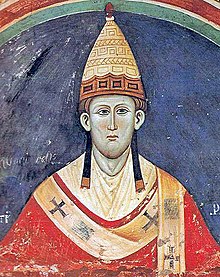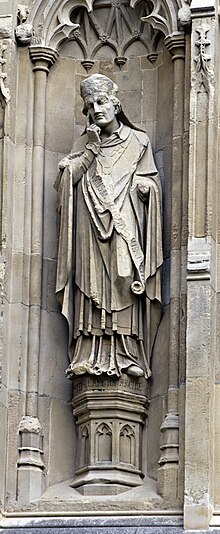John falls out with the Pope and showing himself an anti – semite, on the Jewish people he puts the bite!
‘The people known as the Jews,
had always to the English Crown paid their dues!
Now John behaved in a way that gave every child of Israel, a particularly nasty case of the blues!’

In his desperate quest for money, John turned to England’s Jewish community and taxed them mercilessly. In 1210 he had the entire adult Jewish population arrested and demanded that they give a full account of their wealth or lack of it. Even the poorer members amongst the Jewish people were subject to this appalling scrutiny. The king now declared that the loans made by the Jewish people were to be immediately transferred to the crown. John’s high handed treatment of the Jewry had a knock on effect on his own English subjects. Christian borrowers now found themselves confronted by a demand for immediate re-payment to the exchequer. The Jewish lenders were happy to allow their borrowers time to repay; not John.
‘Borrowing from the Jewish banks!
You paid interest and with some thanks!
When from John the people do borrow!
The result for all will be a great deal of sorrow’!
Furthermore many Jewish people suffered violence and some were forced to leave the kingdom. This episode left an indelible stain on the reign of King John for posterity.
Pope Innocent thinks that King John is not innocent, but guilty!
Pope Innocent III

In July 1205 the see of Canterbury became vacant on the death of Hubert Walter and this led to a rift between the English Crown and Rome. John had wanted his own candidate, John de Gray to be Archbishop of Canterbury and was unhappy with the Pope’s appointment of Stephen Langton to the position. There were two issues here, one was that John, as king, felt that he should be consulted about such an important appointment as a matter of course. The second was Stephen Langton himself. The king’s principal objection to Langton was that he had been consorting with his enemies in France and was therefore unsuitable for the position.
The Pope selected Langton but the king wanted de Gray!
For the kingdom of England, big trouble was on the way!
Innocent decided to place England and Wales under interdict, the terms of which were read out in every church on Sunday March 23rd 1208. Mass was no longer to be said nor the sacraments administered. Marriages could not take place in church and the dead were not to be buried in consecrated ground.

The interdict struck at the very heart of medieval life and its structure. This meant that religious practices, so important to people, could no longer be performed. The entire nation went into a religious and spiritual limbo.
Incensed, John responded by confiscating all of the property of every cleric in the kingdom. Thereby taking advantage of a most unfortunate situation in order to enrich himself.
‘Does this not show the measure of King John the man!
For the denial of important religious observances, he don’t give a damn’!
He’s coining the church’s cash
Therefore giving the papal treasury something of a bash.
Nothing produced by the church lands found its way to Rome; it flowed into the Exchequer. Innocent excommunicated the king in November 1209. Initially the Pope’s actions appeared not to have troubled John unduly. However, this would change in 1213 with the prospect of an invasion of England by his old nemeses, King Philip ‘deesgusting’ Augustus of France. The king was made a little uneasy by the fact that people believed the prophecy of a hermit, Peter of Wakefield who said that the crown of England would pass to another by Ascension Day, 1213.
The seer appeared to be indicating that John would be dead by the spring of that year. John was enraged that anyone would have the temerity to predict that he would lose his crown. He had the hermit incarcerated at Corfe castle to await Ascension Day which would fall on the 23rd of May. The hermit’s prediction had come at a time of some anxiety for John. The king was very disturbed by the news that the impending invasion by ‘deesgusting’ Augustus was supported by the papacy. This was extremely bad news and John thought long and hard about a solution to his predicament.
‘The man in Rome is backing ‘Deegusting’ Augustus in his bid to invade my royal home!
I have no choice but to agree to allow Stephen Langton to wear his Bishop’s hat under Canterbury Cathedral’s dome’!
It was at this point in May 1213 that the king decided to make peace with the Pope and accept Stephen Langton as Archbishop of Canterbury.
Installed at Canterbury at last!
Statue of Stephen Langton at Canterbury.

Then John did something quite extraordinary. On May 15th’ eight days before Ascension Day, in the presence of the papal nuncio, Pandulf, he ceremoniously handed his crown and lands over to the Pope. John announced that he was sorry for his sins and the trouble that he had caused the papacy. In this respect, the prediction of Peter of Wakefield had indeed come to pass but not in the way that so many had anticipated.
‘John grants to the Pope, the kingdoms of England and Eire!
As a sign that from henceforth he will, in his princely dealings be fairer’!
He solemnly declared that the gift of his kingdom to the Holy See was an act of atonement for his past indiscretions. However, John was doing so on the understanding that he be granted his kingdom back as a papal fief. It was an act of symbolism because John retained complete control of his kingdom as monarch. However it had the desired effect of causing Pope Innocent to withdraw his support for the French king’s invasion. The papal legate, Pandulf visited Philip Augustus and the invasion did not take place!
‘De-esgusting Augustus had hatched a plan so pernicious!
But I outwitted him and it tastes absolutely delicious!
My kingdom from French invasion is now safe and secure!
The expression on Deesgusting Augustus’s face is angry and dour!’
John was jubilant at his success in thwarting De-esgusting Augustus and he decided that a grand celebration was in order. The date for the festivities to begin was surprisingly enough, Ascension Day which that year fell on May 23rd. John decided that the venue for the revelry was to be Ewell and a joyous celebration it was for the assembled nobles and senior clerics. The guests pitched their grand, colourful tents in the luscious green fields and caught up with old friends and jested as only old acquaintances can. They all feasted royally and the entertainment was splendid, as indeed the occasion warranted. The king was in fine mettle amidst the general merriment, as the fourteenth anniversary of his coronation was to fall four days later on May 27th.
One significant aspect of the celebrations which was important to John was left unnoticed by the invited guests. Although some might have noticed a cryptic smile on the kings lips as he sipped from his goblet, few could have discerned its origin.
This was because the event took place many miles away in Dorset on May 28th. The hermit, Peter of Wakefield who had predicted that the crown of England would pass to another before Ascension Day 1213 was taken from Corfe castle and hanged until quite dead.
The bailey of Corfe Castle which was built around the time of Peter of Wakefield.

The unfortunate seer’s only company on this, his last involuntary public appearance was his son who shared the same fate as his father.
Sometimes being proved right can really be the wrong thing to do.